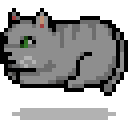CDC detects Bird Flu Mutation in Human, amid new Infections in Cats. [🦠  ]
]
The ongoing spread of bird flu in the United States has alarmed experts — not just because of human cases causing severe illness, but also due to troubling new instances of infections in cats.
https://www.cdc.gov/bird-flu/spotlights/h5n1-response-12232024.html
#h5n1 #birdflu #virus #mutation #pets #cats #infections #pandemic #us #cdc #healthcare #engineer #media #science #health #tech #nature #news
 ]
]The ongoing spread of bird flu in the United States has alarmed experts — not just because of human cases causing severe illness, but also due to troubling new instances of infections in cats.
https://www.cdc.gov/bird-flu/spotlights/h5n1-response-12232024.html
#h5n1 #birdflu #virus #mutation #pets #cats #infections #pandemic #us #cdc #healthcare #engineer #media #science #health #tech #nature #news
Genetic Sequences of Highly Pathogenic Avian Influenza A(H5N1) Viruses Identified in a Person in Louisiana
CDC has sequenced the influenza viruses in specimens collected from the patient in Louisiana who wasAvian Influenza (Bird Flu)
![Instead, the Centers for Disease Control and Prevention (CDC) said the mutations were "likely generated by replication of this virus in the patient with advanced disease," emphasizing that no transmission of the mutated strain to other humans had been identified.
Several experts contacted by AFP cautioned that it was too early to determine whether these changes would make the virus more transmissible or more severe in people.
Angela Rasmussen, a virologist at the University of Saskatchewan in Canada, explained that while the mutation might help the virus enter cells more easily, additional evidence [such as animal testing] would be needed to confirm any effect on transmissibility.
Moreover, similar mutations have occurred in previous critically ill patients without leading to broader outbreaks. "It's good to know we should be looking out for this," Rasmussen said, "but it doesn't actually tell us, [Oh, we're this much closer to a pandemic now]." Instead, the Centers for Disease Control and Prevention (CDC) said the mutations were "likely generated by replication of this virus in the patient with advanced disease," emphasizing that no transmission of the mutated strain to other humans had been identified.
Several experts contacted by AFP cautioned that it was too early to determine whether these changes would make the virus more transmissible or more severe in people.
Angela Rasmussen, a virologist at the University of Saskatchewan in Canada, explained that while the mutation might help the virus enter cells more easily, additional evidence [such as animal testing] would be needed to confirm any effect on transmissibility.
Moreover, similar mutations have occurred in previous critically ill patients without leading to broader outbreaks. "It's good to know we should be looking out for this," Rasmussen said, "but it doesn't actually tell us, [Oh, we're this much closer to a pandemic now]."](https://friendica-leipzig.de/photo/preview/600/405816)
![[ImageSource: Centers for Disease Control & Prevention (CDC)]
A sample of the virus found in a critically ill patient in the United States has shown signs of mutating to better suit human airways, although there is no indication it has spread beyond that individual, authorities report.
An analysis posted by the CDC revealed that a small percentage of the virus in the patient's throat carried genetic changes that could increase the virus's ability to bind to certain cell receptors found in the human upper respiratory tract.
Importantly, the agency noted that these changes have not been detected in birds – including in the backyard poultry flock believed to have been the source of the patient's initial infection.
Earlier this month, officials announced that an elderly Louisiana patient was in "critical condition" with a severe H5N1 infection. And now, a updated @CDCgov technical report on the Louisiana case is out. There are low frequency mutations in HA that indicate adaptation in a human host [specifically this human host]. [ImageSource: Centers for Disease Control & Prevention (CDC)]
A sample of the virus found in a critically ill patient in the United States has shown signs of mutating to better suit human airways, although there is no indication it has spread beyond that individual, authorities report.
An analysis posted by the CDC revealed that a small percentage of the virus in the patient's throat carried genetic changes that could increase the virus's ability to bind to certain cell receptors found in the human upper respiratory tract.
Importantly, the agency noted that these changes have not been detected in birds – including in the backyard poultry flock believed to have been the source of the patient's initial infection.
Earlier this month, officials announced that an elderly Louisiana patient was in "critical condition" with a severe H5N1 infection. And now, a updated @CDCgov technical report on the Louisiana case is out. There are low frequency mutations in HA that indicate adaptation in a human host [specifically this human host].](https://friendica-leipzig.de/photo/preview/600/405818)
